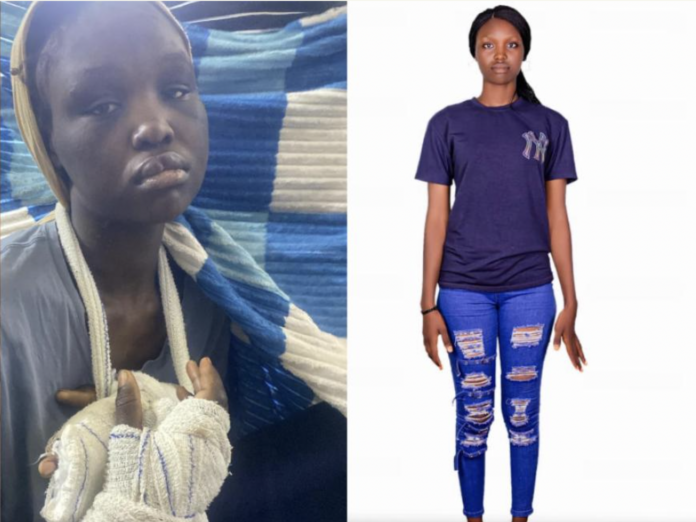A heart-wrenching tale of human trafficking, torture, and survival unfolded on Friday, January 3, 2025, as Odunayo Eniola Isaac, a 28-year-old Nigerian woman, finally returned to Nigeria after enduring nearly two years of brutal mistreatment in Iraq. Her escape from the horrors she endured was catalyzed by an exclusive report by SaharaReporters, which shed light on her plight and prompted swift intervention from Nigerian authorities.
Odunayo, originally from Osun State in Nigeria’s southwest, was trafficked to Iraq under false pretenses. Promised a better life and employment opportunities, she was deceived by a notorious human trafficker, Alhaja Yusuf Shakira, known as Mama Uganda. This trafficker, in collaboration with an Iraqi agency, Blend Warani, transported Odunayo to Iraq in February 2023, where she was forced into grueling and hazardous labor conditions.
Upon her arrival, the reality of Odunayo’s situation was nothing short of horrific. Her employer, identified as Saba Akram, and his wife subjected her to unrelenting physical and emotional abuse. The workdays were excruciatingly long—often stretching up to 20 hours—leaving Odunayo with no time to rest or recover.
In a desperate plea shared with SaharaReporters, Odunayo recounted the unimaginable cruelty she suffered. “The beatings were endless. They used tasers, metal rods, and other brutal methods to hurt me. I didn’t have a moment of peace,” she shared, her voice breaking as she remembered the torture she endured. The physical pain was coupled with emotional torment: her employer confiscated her phone, isolating her from her family and preventing any contact with the outside world.
The situation reached its peak when Odunayo’s employer’s wife attempted to take her life, wielding an iron rod and boiling water in a murderous attack. By sheer luck, Odunayo managed to escape to a nearby police station, narrowly evading death. “If I had stayed any longer, I would not have survived,” she said.
Her suffering continued unchecked for over a year until she reached a breaking point. In December 2024, Odunayo made a final plea for help through the Nigerian-based human rights organization, Hopes Haven Foundation, which then reached out to SaharaReporters. Her distress call painted a chilling picture of despair as she begged for her life. “Please, help me return to Nigeria. I’m afraid they will kill me,” she implored.
The story was quickly picked up by SaharaReporters, and the Nigerian mission in Jordan, which oversees Iraq, was alerted. Officials from the Nigerian mission, along with the National Agency for the Prohibition of Trafficking in Persons (NAPTIP), took immediate action to secure Odunayo’s release and ensure her safe return to Nigeria.
Abdulrahman Balogun, the Head of Media Unit at the Nigerian Diaspora Commission (NiDCOM), confirmed that Odunayo had departed Baghdad on January 2, 2025, via Egyptair. Her journey included a layover in Cairo before continuing to Nigeria, where she was expected to land in Abuja later that day.
The rescue marked the end of an excruciating chapter in Odunayo’s life. Upon her arrival at the Abuja International Airport, she was promptly taken into custody by officials from NAPTIP, where she would undergo a thorough assessment and begin the process of recovery. “This is a victory for all Nigerians who are victims of human trafficking. I am grateful to everyone who made my return possible,” Odunayo said, her eyes filled with relief and gratitude.
Human trafficking has been a longstanding issue for Nigeria, with many citizens falling victim to false promises of better job opportunities abroad. Iraq, in particular, has become a notorious destination for traffickers exploiting vulnerable individuals. Despite the dangers, countless Nigerians continue to seek employment overseas, often lured by deceptive agents offering attractive job prospects in the Middle East.
The case of Odunayo Eniola Isaac is a stark reminder of the dangers of human trafficking and the need for greater vigilance and stronger enforcement mechanisms to protect Nigerian citizens, both at home and abroad. It also underscores the crucial role of investigative journalism in exposing human rights violations and holding perpetrators accountable.
While Odunayo’s case has drawn attention to the issue of trafficking, her survival and eventual return home are also a testament to the power of community action, media involvement, and diplomatic intervention. Her ordeal serves as a warning to others, highlighting the risks of seeking employment overseas without thorough vetting and a clear understanding of the conditions abroad.
The Nigerian government has vowed to continue its efforts to combat human trafficking and ensure that justice is served for victims like Odunayo. However, questions remain about how trafficking syndicates continue to operate with impunity and what more can be done to prevent such tragedies in the future.
As Odunayo begins the long road to healing, she is not only reclaiming her life but also becoming a beacon of hope for other victims trapped in similar circumstances. “I am free now, but I know there are many others out there suffering just like I did,” she said. “I want my story to give them hope that they can escape, too.”
Her return to Nigeria has sparked widespread discussions about the need for improved protections for Nigerians working abroad, and the critical role of media in bringing these issues to light. It is hoped that her story will inspire continued efforts to combat human trafficking and protect the most vulnerable members of society.

